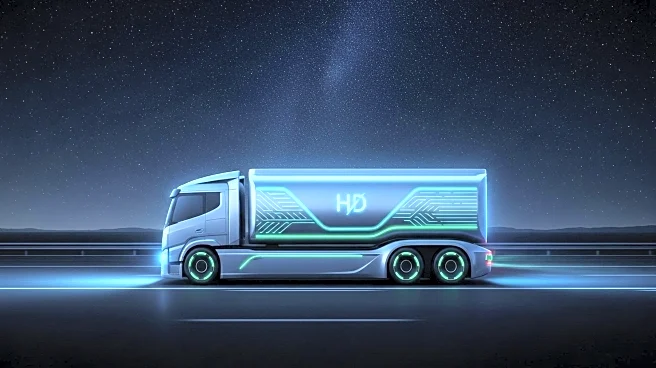What's Happening?
Hyundai Motor's hydrogen fuel cell autonomous truck, Xcient, has been named one of TIME magazine's 'Best Inventions of 2025.' The announcement was made on October 9, highlighting Xcient among 300 innovations across various categories, including robotics and artificial intelligence. The truck is equipped with 'SuperDrive,' a Level 4 autonomous driving software developed by PlusAI, a U.S. commercial vehicle automation company. This level of autonomy allows the vehicle to operate without human intervention under certain conditions. Other Korean products featured on TIME's list include innovations from Samsung Electronics and LG Electronics.
Why It's Important?
The recognition of Hyundai's Xcient truck as a top invention underscores the growing importance of sustainable and autonomous technologies in the automotive industry. Hydrogen fuel cell technology offers a cleaner alternative to traditional fossil fuels, aligning with global efforts to reduce carbon emissions. The integration of autonomous driving capabilities further positions Hyundai as a leader in innovative transportation solutions. This development could influence industry standards and encourage other manufacturers to invest in similar technologies, potentially reshaping the future of commercial transportation.
What's Next?
Hyundai's achievement may prompt increased interest and investment in hydrogen and autonomous vehicle technologies. As the industry moves towards more sustainable solutions, regulatory bodies might consider new policies to support the adoption of such technologies. Additionally, competitors may accelerate their own research and development efforts to keep pace with Hyundai's advancements. The broader impact could include shifts in market dynamics and consumer preferences towards eco-friendly and autonomous vehicles.
Beyond the Headlines
The recognition of Hyundai's Xcient truck highlights ethical and environmental considerations in the automotive industry. The push towards hydrogen fuel cells reflects a commitment to reducing environmental impact, while autonomous technology raises questions about safety, job displacement, and regulatory challenges. Long-term, these innovations could lead to significant cultural shifts in how society views transportation and energy consumption.









